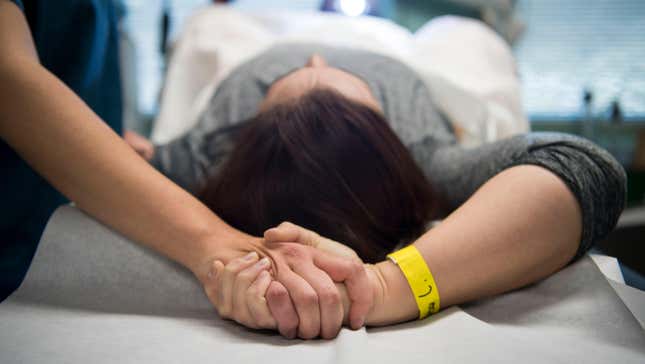Missouri Woman Denied Emergency Abortion Called a State Senator for Help. He Sent Her to an Anti-Abortion Clinic.
Mylissa Farmer's water broke 17 weeks into her pregnancy and the fetus was dying inside her, but she couldn't legally get an abortion in the state.
AbortionPolitics

In August, a pregnant Missouri woman named Mylissa Farmer suddenly needed an abortion, just over a month after her state enacted its near-total abortion ban. Her water had broken 17 weeks into her pregnancy, and her medical records indicated a number of health factors placing her at greater risk of pregnancy-related complications, including increased risk of sepsis, loss of her uterus, and even death. Farmer is also 41-years-old. Doctors treating her recommended an abortion, but, of course, couldn’t provide her one under state law, reported the Springfield News-Leader.
Farmer and her partner consulted with doctors and experts across several states and made “countless phone calls,” with—in her words—“a baby dying inside me.” They learned there was no way for their wanted pregnancy to be viable or even last another six weeks, since Farmer’s cervix was already open. If she waited it out, she and the fetus could suffer tremendously. “The thing [a doctor] said was, ‘There are things worse than death, and I have seen it,’” Farmer recounted.
Farmer told the newspaper she’s always identified as “pretty pro-life”—but she found herself seeking abortion care, anyway, even calling her state senator’s office to seek help. She didn’t find it.
The office of her state senator, a Republican named Bill White, told her the state ban that was literally jeopardizing her life was actually “designed to protect the woman’s life.” Farmer recalled telling White’s aide, “It’s not protecting me.… There’s no chance for a baby; she’s not going to make it. It’s putting my life in danger.” She continued, “I’m 41, it’s not something I can recover from quickly. I could lose my uterus, there’s a lot of things that could happen. We just want to move on, we just want to grieve.” White’s office promised it would talk to the state’s Attorney General Eric Schmitt on her behalf and then connected Farmer with an anti-abortion crisis pregnancy center in the state. Farmer never heard from White’s staff again.
-

-

-

-

-

-

-

-

-

-

-

-

-

-

-

-

-

-

-

-

-

-

-

-

-

-

-

-

-

-

-

-

-

-

-

-

-

-

-

-








































